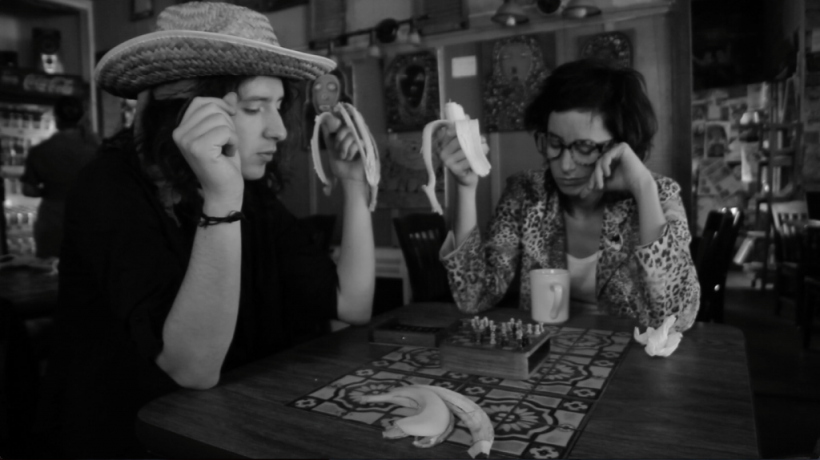
RETRIBUTION ON LOW CHARGE (in postproduction) © Clara Winter & Miiel Ferráez
A French boy is sitting in a ballet lesson in Mexico. It is a class for girls and he does not speak a word of Spanish. Only one of the girl dancers eventually acknowledges him, sits down beside him, shows him the most important poses and comments on them. He paints a bird, which she notices. The picture surmounts their language barrier, as do her gestures. Her fingers dance along his leg. She takes the pencil and paints a second bird next to his one. It is completely different to his bird – more rudimentary, almost sketch-like and quite odd – yet it still completes the picture. Both images could stand for the hope of freedom and the desire for agility and movement. A film that unequivocally shows it wants to be interpreted: The girl is suffering under the rules of the ballet class. The boy travelled halfway round the world just a day before. Yet for that, the flying animal he has drawn is perched quite snugly on a branch.
A scene from “assemblé”, the 2011 graduation film from the Mexican artist Miiel Ferráez – embedded in a classic, screenplay-based narrative. Nowadays, together with the Leipzig-based video artist Clara Winter, he is exploring a more light-footed, politicised film concept, comparatively speaking. Their most recent work “Wir sprechen heute noch Deutsch”(We Still Speak German Today, 2019) has just been in the media, because the two of them won the German Short Film Award in the experimental film category. Ferráez himself appears before the camera in the film, reciting text fragments from German integration courses for immigrants. He is standing in front of buildings belonging to German corporations, in front of German cars and restaurants, and of course in front of the German Goethe Institute: German places where the German contribution to globalisation manifests itself internationally.
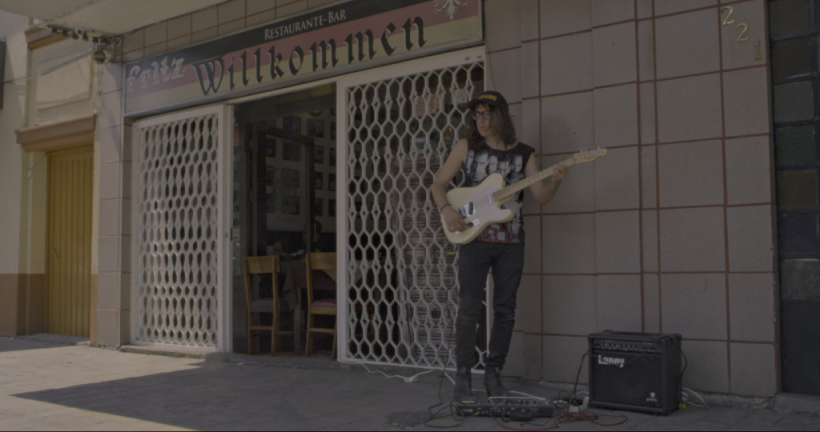
WIR SPRECHEN HEUTE NOCH DEUTSCH © Clara Winter & Miiel Ferráez
The two of them have worked together for several years and already produced five films by now. In fact, this dynamic duo step before the camera themselves in their undertakings, where they increasingly explore positionings, semi-fictions and plays with symbols. Filmic styles that could barely be more different clash with each other in their encounters – resulting in new questions and methods. Together with their explicit questioning of social statuses and nationality, the films from the two of them provide a record especially of an artistic evolution and the development of a transcultural style. And in relation to the German and indeed Mexican cinema, their experiments seem delightfully misplaced.
Clara Winter began by making straightforward documentaries. From 2011 to 2014, she created intimate films about her surroundings, shot in the left-wing scene in Toulouse, where she studied at the École Supérieure des Beaux-Arts for a while. Parallel to this, she worked in an interdisciplinary context in Leipzig, among others in a band project, from which a musical and an exhibition resulted. The French works from that time explore the basic grammar of cinematography and are explicitly dedicated to individual persons. Winter and her camera entered into concentrated dialogues with various anarchists: “Mika” (2012), “Laurent” (2012) and “Olivier” (2013) are the portraits she created. The films recount men who are struggling against the system, squatters defending the living spaces from claims of ownership and police violence, as well as a yoghurt attack on Sarkozy and maniacal bicycles. Yet ultimately they are about utopias and the optimism needed to keep the world up and running. Or giving them a shakeup at best.
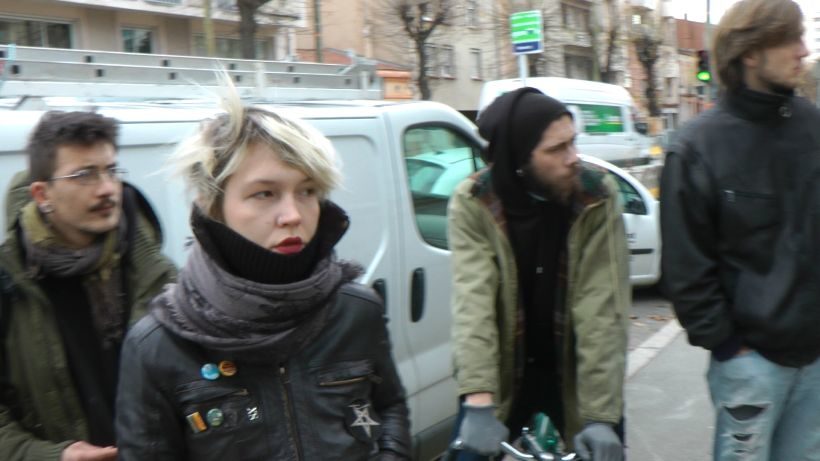
MIKA (Clara Winter, 2013) © Clara Winter
“Mika” is a disturbing work. The person who accords the film its name does not appear in it at all. He died during a fight from a gunshot to his heart – right in the middle of a housing project where he lived, and thus where Clara Winter was also staying regularly at that time. This event has a devastating effect on everyone’s reality of life: With Clara Winter using her thoughts as a diary-like mirror and speaking about her own perception of what has happened – about grief, group dynamics, the need to deal with the police and their investigations, the questioning about the case, the immediate detention of the people in the house for a night, the authorities’ suspicions, the ultimate eviction of them from the housing project. Yet for that with a light gesture at the end. The joy in still being alive and not in prison, linked to an anecdote about the cinema. Likewise Laurent, who gives his name to the second film in the series, speaks about overcoming pessimism: “It’s not very difficult.”
In her films from this time, Winter does not shy away from seeing herself as a reflection of the related circumstances, from looking at the direct realities of life and the people in her circle of friends. These films are characterised by their lack of distance. Even “Beziehungsarbeit” (2012-2013, with Lina Walde) and “L’absence de marquage” (2014) work on a documentary level. Yet now, the aim is to provoke situations for the camera: Winter and Walde flirt with strangers, get drunk and philosophise. In “L’absence de marquage”, Clara Winter gets into cars, in constant motion, talking to the people at the steering wheel and the passengers. When they reveal something about themselves during the drive, she repeatedly retorts with private aspects, processing a separation. A note about this is attributed to her ex-boyfriend, to whom the film is also dedicated.
In her first film with Miiel Ferráez, Clara Winter’s voice reckons that she has found the young man in Mexico and presents him as a filmmaker. A twinkling of the eye occurs and it immediately becomes clear: This shared narration is ambiguous. The European woman is speaking about the Mexican man, recounting a shared journey that failed. Clara and Miiel are and act themselves, and at the same time serve themselves up before the camera as semi-documentary symbols: “Just Kids Left Alive on the Road” (2014), the name does not solely designate people anymore, but also stereotypes. These kids are like many kids.
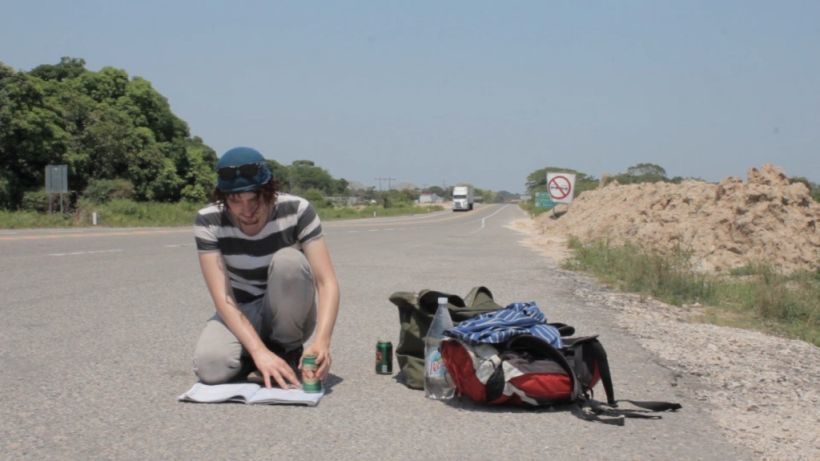
JUST KIDS LEFT ALIVE ON THE ROAD © Clara Winter & Miiel Ferráez
Just prior to this, Miiel Ferráez explored plays on staging and enacting, with blurring levels of reality: “El Cursor Intermitente” (2013) is a film about a man in Mexico who is writing a story. Like the boy before him in “assemblé”, he is preoccupied with leaving his homeland, with breaking free, and a sense of forlornness. In a pictorial fantasy, the writer encounters a woman with whom he has eloped, sits down beside her at the water’s edge and thinks about new steps in life. When a loud argument among gangsters ensures in the adjoining room in the hotel, the tranquillity of the writer’s dreamt-of fantasy beach also becomes derailed to the point of escalation. The narrative levels implode into each other and the writer loses his sense for the here and now.
The duo’s cooperative efforts utilise the conscious deforming of the real to an ever greater extent. After they formulate a kind of parody of their own middle-class feelings in “Just Kids Left Alive on the Road”, “Postcolonialism in 30 sqm” (2015) then exaggerates these sensitivities even more clearly: Winter mimics a European woman in Mexico who, because of a bad conscience, intrudes into the home of a young Mexican man and changes it around completely in accordance with her own feelings. The message being: She is placing herself at the service of postcolonial restitution. But soon, rules are introduced where none were before, with the camera acting as a substitute diary for both of them, compiling increasingly frustrated accusations. The film underscores its fabricated nature at regular intervals and presents itself in letters blazing up frantically as a caricature of a reality soap. The situation escalates, and ultimately negotiates on a small scale that which characterises both old and new colonialism on a large one: Opportunism and arrogance, presented with a sanctimonious naivety.
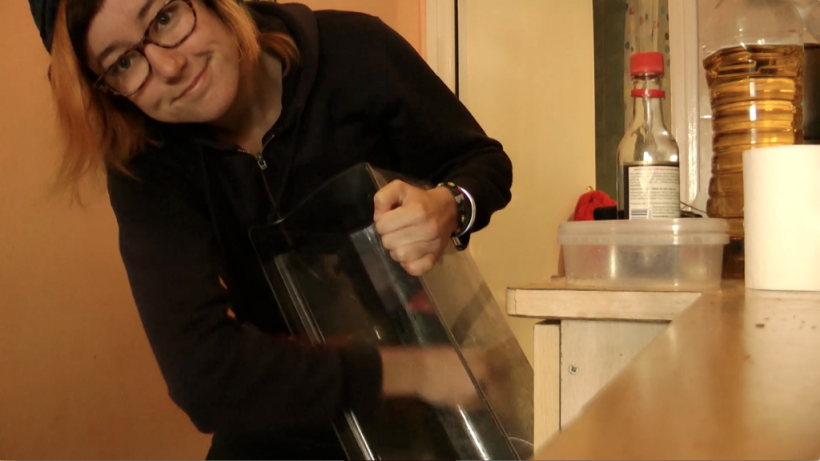
POSTCOLONIALISM IN 30 sqm © Clara Winter & Miiel Ferráez
The latter has become an aesthetic method from this duo, underscoring the social-revolutionary subtext of their films. The exaggerated cliché of a cluelessness that damages – also on the part of art production – recurs in just about every work from them. As a counterpart to Clara Winter, Miiel Ferráez succeeds in reinventing himself in the sense of this stylistic method over and again. From being an almost silent companion on an affluence expedition in Mexico in “Just Kids Left Alive on the Road”, he becomes the victim of the private European conspiracy described above in “Postcolonialism in 30 sqm”, before then being transformed into an omniscient commentator in “Poor People Relax Me” (2017), who poetises Clara Winter with artificial optimism. In the end, he appears as a personified globalisation critic and recites the most absurd doctrines in “Wir sprechen heute noch Deutsch”.
In their shared films, Winter initially acts as a dominating, self-ironic narrator, providing bait for punchlines and working on her own artist persona. After “Poor People Relax Me”, she features increasingly in the background. With the films advancing to become abstract questions and arrangements: “Beyond Beach”, the most rigorous piece, works especially well at experimental film festivals. Here, Winter and Ferráez take a step back as the leading figures and subordinate themselves to a panorama of clichés and archetypes. Tourists are the determining factor in the film. People from affluent nations who finally want to get out again. That which is semi-romantic poppycock in “Just Kids Left Alive on the Road” becomes the industrialised endpoint here, as complete “Latin-American adventures” are turned into consumer products made from spontaneous “hippy actions”: Hanging out on the beach and renunciating humanism forms a homely, sun-warmed unit here. A woman even says so directly into the camera: “On the whole, I’m not good. It’s not one of my character traits.”
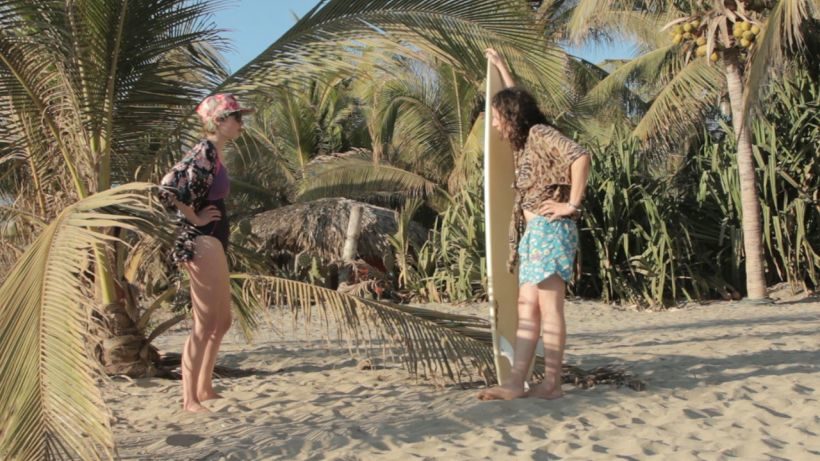
BEYOND BEACH © Clara Winter & Miiel Ferráez
The woman’s name is Megan Marsh, and she has appeared before as Clara Winter’s artist friend in “Poor People Relax Me”. She is not the only familiar face found within their shared filmic cosmos. Elsewhere for instance, Ferráez regular actress Sophie Gómez can be seen playing the role of an overly strict curator who is supposed to evaluate Clara Winter’s shots of hotdogs. The cinematic setting is not sufficient “site-specific” for a Mexican artwork, she opines.
The expanding of Winter’s and Ferráez’s cinematic performances with a recurring ensemble underlines, on the one hand, the increasing artificiality and playfulness of their filmic designs. On the other hand, they blur that which was even more clearly palpable in Winter’s earlier films: A feeling for the clarity of circumstances that are convulsing. More than merely defining, their shared works pose questions about which degree of irony permits a social revolutionary and art policy claim to fizzle out, or which helps it to unfold in the first place. Thus, for instance, Hito Steyerl’s question about the blind spot of art – the immediate conditions for its production and reception – occurs just once in “Poor People Relax Me” as a minor side note, linked to a wordplay on washing lines: “I lost the line.” If the question were just imperceptibly greater, the film would barely be able to elude its didactic tendencies. That went well, just about.
Clara Winter’s evident curiosity for farce and costuming, as indeed for the idea of an artificial persona as a chameleon, is initially unsurprising, considering that she studied under Bjørn Melhus (Kunsthochschule Kassel art school). And yet she enthuses and excites with each new step she takes, because other, different questions are negotiated in her generation, in her gender, her milieu, and ultimately in the resulting codes and methods to those Melhus himself could pose. In his solo project “El Misericordioso Vampiro de la Miseria” (2016) produced parallel to this, as well as in his segment for their shared video work “The remorseless goatgrinder of capital” (2018), Miiel Ferráez adopts a more serious tone of voice. He ultimately appears as a dialogue partner, whose view – elaborated together on the specifically derisory aspects of their privileged position – creates an irony that is both inevitable and yet possible at all. Humour becomes the way to approach the currently compelling European identity crises. With the steps becoming interesting that result from these crises.
Filmography:
2019
WIR SPRECHEN HEUTE NOCH DEUTSCH
TERRIBLE BUT BEARABLE
2018
BEONYD BEACH
THE REMORSELESS GOATGRINDER OF CAPITAL
2017
POOR PEOPLE RELAX ME
2016
EXPLORERIN 2009
MAXIMUM SURRENDER
2015
POSTCOLONIALISM IN 30 sqm
2014
JUST KIDS LEFT ALIVE ON THE ROAD
2013
BEZIEHUNGSARBEIT 2 (mit Lina Walde)
THE BORING FEELING OF NOTHING
I HATE YOU BUT I FUCK YOU
OLIVIER
2012
MIKA
LAURENT
BEZIEHUNGSARBEIT 2 (mit Lina Walde)
2011
INTERIOR